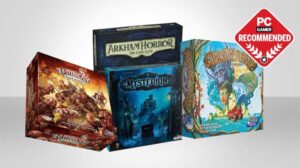
Thematic board games have become a fascinating part of the gaming landscape, captivating players with rich narratives and immersive experiences. These games transport players into diverse worlds, allowing them to engage with themes ranging from fantasy and horror to historical events and science fiction. The combination of storytelling and interactive gameplay sets thematic board games apart from more traditional game formats, creating a deeper bond between players and the game itself.
As we explore the realm of thematic board games, we’ll delve into the unique features that make them stand out, look at popular titles that have captured the hearts of many, and examine how their themes resonate with players. We’ll also discuss how thematic elements compare to other gaming types, offering insights into their broad appeal and significance in the gaming community.
Thematic Board Games Overview
Thematic board games are a genre within the tabletop gaming community that immerses players in rich narratives and intricate settings. These games prioritize storytelling and thematic elements over abstract mechanics, providing an engaging experience that resonates emotionally with players. The significance of thematic board games lies in their ability to create shared experiences and memories, making them a favorite among groups looking to bond over storytelling and strategy.The appeal of thematic board games stems from the diverse themes they explore.
From fantasy realms filled with dragons and wizards to historical settings that transport players to significant periods in time, these games captivate through their immersive worlds. Common themes include science fiction, horror, mystery, and adventure, each offering unique gameplay experiences. The thematic elements not only enhance the aesthetic but also influence player strategies and interactions, deepening the overall engagement.
Comparison with Other Types of Board Games
Thematic board games differ substantially from other types such as abstract strategy games or classic family games, particularly in gameplay and player engagement. While abstract games focus primarily on strategy and mechanics devoid of narrative, thematic games weave intricate stories into their mechanics. The following points Artikel key differences:
- Story Integration: Thematic games incorporate narratives that drive player actions, while other games may lack a cohesive story.
- Player Investment: Players often feel a deeper emotional connection to thematic games, enhancing their investment in outcomes compared to more mechanically-driven games.
- Replayability: Thematic board games, with their evolving storylines and character developments, often provide more varied experiences over multiple plays, in contrast to traditional games that may become repetitive.
- Game Components: Thematic games typically feature elaborate components, including detailed miniatures, themed artwork, and immersive soundtracks, all of which enhance the storytelling aspect.
“Thematic board games are not just about winning; they are journeys that players embark upon together.”
In summary, while all board games share the common goal of providing entertainment, thematic board games stand out for their rich narratives and immersive experiences that foster connections among players, making them a vital part of the gaming community.
Popular Examples and Their Features

Thematic board games have gained immense popularity due to their capacity to transport players into rich narrative worlds. These games not only entertain but also engage players emotionally and intellectually, making them memorable experiences. In this section, we will explore some of the most popular thematic board games, their unique features, and the elements that contribute to their immersive nature.
Popular Thematic Board Games
Several thematic board games stand out for their creativity and engaging gameplay. Each game offers a distinctive experience that appeals to different types of players. Below is a selection of notable examples:
- Gloomhaven: A cooperative tactical combat game set in a dark fantasy world. Players take on the roles of mercenaries, each with unique abilities, as they embark on quests and explore a branching story. The game is notable for its deep character development and a persistent world that evolves based on players’ decisions.
- Dead of Winter: This game combines cooperative and competitive play in a post-apocalyptic setting. Players must work together to survive against zombie hordes while dealing with personal goals that can lead to betrayal. The game excels in creating tension and moral dilemmas through its robust storytelling and varied scenarios.
- Ticket to Ride: A classic railway-themed game where players build train routes across different maps. Its simplicity and strategic depth allow for players of all ages to engage. The historical aspect of train travel adds an educational layer to the experience.
- Arkham Horror: Set in the Lovecraftian universe, this cooperative game pits players against ancient horrors. The game is rich in narrative, with players exploring a city while encountering various monsters and cultists. The atmosphere and storytelling immerse players in a world of cosmic dread.
- Scythe: A strategic game set in an alternate history post-World War I Europe. Players control factions vying for power and territory. The game’s unique combination of resource management, engine building, and combat offers a mix of strategy and thematic depth.
Elements of Immersion and Engagement
The immersive nature of thematic board games can often be attributed to several key elements that enhance player engagement. These elements create a sense of presence and investment in the game’s narrative.
- Storytelling: A rich narrative is central to thematic games, providing context and motivation for player actions. Engaging stories draw players into the game world, making each session feel like part of a larger saga.
- Artwork and Design: High-quality visuals and thematic design significantly enhance immersion. Illustrations, components, and board designs that reflect the game’s theme contribute to the overall atmosphere, making players feel like they are part of the world.
- Character Development: Many thematic games allow players to develop their characters over time, adding a personal stake in the outcome. This evolution fosters emotional connections that keep players invested.
- Player Interaction: Engaging interactions among players can elevate the experience. Cooperative challenges, competitive elements, and negotiation foster a dynamic environment where players become part of the story.
Role of Storytelling
Storytelling is a fundamental aspect of thematic board games that enriches the player experience in numerous ways. Through narrative, players not only follow the game mechanics but also become emotionally invested in the story unfolding around them.
“A strong narrative adds depth to gameplay, transforming players from mere participants into characters in a shared story.”
In thematic games, storytelling often involves quests, character arcs, and evolving challenges that reflect player choices. The incorporation of narrative elements encourages players to think about their strategies in the context of the story, leading to more meaningful decisions. Game mechanics intertwined with narrative threads create memorable moments, while player actions can alter the course of the story, enhancing replayability.Overall, the combination of deep storytelling, immersive artwork, and interactive gameplay creates a captivating experience that draws players into the world of thematic board games.
Players are not just playing a game; they are embarking on an adventure, crafting their own stories along the way.
Related Gaming Categories
The exploration of thematic board games opens up a wider conversation about related gaming categories that share various elements in gameplay and storytelling. Each category presents its unique mechanics while often overlapping with thematic narratives that enhance player engagement. Understanding these connections can enrich the appreciation of gaming as a whole.
Comparison with Card Games
Thematic board games often intertwine storytelling with mechanics, much like card games, but with key differences in gameplay structure. In thematic board games, players typically engage in a broader narrative experience, often involving exploration, character development, and immersive worlds. Card games, on the other hand, may emphasize strategic play based on hand management and turn-based mechanics rather than an overarching theme.
Gameplay Mechanics
Thematic board games often use a board and various pieces to represent characters, locations, and events, integrating player choices within a narrative context. Card games rely more on decks and hands of cards, where players draw, play, and discard strategically to achieve victory.
Narrative Depth
Thematic board games usually provide a deep narrative experience through scenarios and character arcs, while card games often focus on quick, competitive gameplay with less emphasis on story.
Integration of Thematic Elements in Arcade and Coin-Op Games
Arcade and coin-op games also feature thematic elements, though they are integrated differently than in traditional board games. These games often employ vibrant graphics, sound effects, and engaging narratives to create an immersive experience.
Visual and Audio Elements
Thematic arcade games use eye-catching graphics and sound design to convey themes, as seen in titles like “Street Fighter” and “Pac-Man,” where the gameplay is closely tied to the characters and their stories.
Game Mechanics
Players often experience thematic narratives through arcade-style gameplay, which involves quick reflexes and competitive scoring, distinguishing them from the slower, more strategic nature of thematic board games.
Influence on Online Games and Digital Formats
The thematic elements present in board games have significantly influenced the design and popularity of online games. Many digital titles strive to adapt the immersive storytelling associated with thematic board games.
Adaptation of Themes
Online games like “Tabletop Simulator” or “Gloomhaven” offer digital adaptations of board game mechanics, allowing for rich narrative experiences in a virtual format. This transition has expanded the accessibility of thematic gameplay to a broader audience.
Community Interaction
Online platforms foster community engagement, where players can share experiences and collaborate on strategies, closely mirroring interactive elements found in thematic board games.
Comparison with Roleplaying Games
Thematic board games and roleplaying games (RPGs) share a commitment to narrative depth and player interaction, yet they differ in mechanics and engagement levels.
Narrative Depth
RPGs often delve deeper into character backstories and world-building, allowing players to influence the narrative significantly. In contrast, thematic board games may have a set storyline with less flexibility for player-driven plot changes.
Player Interaction
Both game types encourage player engagement, but RPGs often involve more extensive character interactions and dialogue, while thematic board games focus on strategy and resource management within a shared narrative framework.
Adaptation of Thematic Concepts in Video Games
The integration of thematic concepts into video games has transformed gameplay styles across various genres, allowing developers to craft rich, immersive experiences.
Story-Driven Gameplay
Video games like “The Witcher” series or “Dark Souls” incorporate thematic elements of quests, character development, and moral choices, creating interactive narratives that resonate with players.
Gameplay Style Impact
Thematic concepts influence gameplay styles by encouraging exploration and narrative-driven objectives, moving away from traditional objectives toward more immersive storytelling and character-driven experiences.
End of Discussion

In conclusion, thematic board games offer an engaging experience that goes beyond mere gameplay. They invite players to immerse themselves in captivating stories and vibrant settings, elevating the social and emotional aspects of gaming. As we continue to see innovations and adaptations in the gaming world, thematic board games will undoubtedly remain a beloved choice for those seeking adventure and connection through play.
Essential Questionnaire
What makes a board game thematic?
A thematic board game is characterized by its strong narrative and immersive worlds, where gameplay is closely tied to the story and thematic elements.
Can thematic board games be played solo?
Yes, many thematic board games offer solo modes or can be played alone, allowing players to experience the story and gameplay at their own pace.
How do thematic board games differ from traditional board games?
Thematic board games emphasize narrative and player engagement, while traditional board games often focus more on mechanics and competition.
Are thematic board games suitable for all ages?
Many thematic board games are designed for a wide range of ages, but it’s important to check the recommended age rating to ensure suitability for younger players.
What role does art play in thematic board games?
Art is crucial in thematic board games, as it enhances the game’s atmosphere, helps convey the theme, and draws players into the game’s world.





